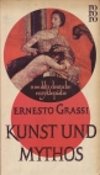Ernesto Grassi (1902–1991)
Auteur de Rhetoric as Philosophy: The Humanist Tradition
A propos de l'auteur
Ernesto Grassi was a professor of philosophy at the University of Munich and director of the Institute of Humanistic and Philosophic Studies.
Séries
Œuvres de Ernesto Grassi
Heidegger and the Question of Renaissance Humanism: Four Studies (MEDIEVAL & RENAIS TEXT STUDIES) (1983) 10 exemplaires
Schiller : Wallensteins Lager + Die Piccolomini + Wallensteins Tod + Dokumente (1961) — Directeur de publication — 6 exemplaires
Goethe : Römische Elegien + Venetianische Epigramme + Tagebuch der italienischen Reise (1961) — Directeur de publication — 4 exemplaires
VICO Y EL HUMANISMO. ENSAYOS SOBRE VICO, HEIDEGGER Y LA RETORICA (Spanish Edition) (1992) 3 exemplaires
Folly and Insanity in Renaissance Literature (Medieval and Renaissance Texts and Studies) (1986) 2 exemplaires
Giacomo Casanova : Memoiren 1 : Bettina : Rom, Paris, Wien : Die Flucht aus den Bleikammern (1925) — Directeur de publication — 2 exemplaires
Giacomo Casanova : Memoiren 2 : Lotterie und Kabbala : Esther : Köln ; Bonn ; Stuttgart : Bekehrung und Verführung :… — Directeur de publication — 2 exemplaires
Philosophie des Altertums. Geschichte der Philosophie 1 (= rowohlts deutsche enzyklopädie) 1 exemplaire
Hans Jaenisch: Aquarelle Aus Amrum 1 exemplaire
Oeuvres associées
Platon. Sämtliche Werke Bd. 1: Apologie des Sokrates, Kriton, Ion, Hippias II, Theages, Alkibiades I, Laches,… (1984) — Directeur de publication, quelques éditions — 59 exemplaires
Menon, Hippias I, Euthydemos, Menexenos, Kratylos, Lysis, Symposion (1993) — Directeur de publication, quelques éditions — 19 exemplaires
Critias ; Philebus ; Statesman ; Timaeus (1998) — Directeur de publication, quelques éditions — 17 exemplaires
Parmenides ; Phaedrus ; Sophist ; Theaetetus [Translation] (1977) — Directeur de publication, quelques éditions — 16 exemplaires
Étiqueté
Partage des connaissances
- Date de naissance
- 1902-05-02
- Date de décès
- 1991-12-22
- Sexe
- male
- Nationalité
- Italy
- Lieu de naissance
- Milan, Italy
- Lieu du décès
- Munich, Bavaria, Germany
- Professions
- philosopher
Membres
Critiques
Vous aimerez peut-être aussi
Auteurs associés
Statistiques
- Œuvres
- 27
- Aussi par
- 7
- Membres
- 132
- Popularité
- #153,555
- Évaluation
- 3.7
- Critiques
- 2
- ISBN
- 29
- Langues
- 4
- Favoris
- 1



